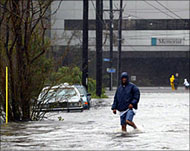Major disruptions seen in storm’s wake
The United States can expect major economic disruption that will ripple worldwide after Hurricane Katrina’s furious winds and rain shut down ports and hammered oil production, according to analysts.

With towns flattened, major deep-water ports on the Mississippi Delta shut down, coastal oil refiners starved of crude and offshore platforms in the Gulf of Mexico evacuated, Katrina has had a devastating effect.
Total economic losses from one of the most powerful hurricanes in US history could go as high as $35 billion, said Peter Zeihan, senior analyst at Stratfor, a global economic and political consultancy in Austin, Texas.
“The big question is how much the rivers and ports have been silted up. It could be fixed in two days, it could be two months,” he said on Tuesday.
“If it’s the longer end, we’re going right into the grain harvest. The US is the biggest grain exporter in the world, and most of those exports go down the Mississippi. So food and feed prices could soar worldwide,” he said.
“And imports of oil and all sorts of other goods will be blocked going upstream. Domestic prices will jump as a result.”
Regional shutdown
The US Coast Guard ordered all ports shut from Morgan City, Louisiana, to Pensacola, Florida, ahead of the storm, which battered the coast as it roared ashore early Monday just east of New Orleans.
Two of the Louisiana tanker terminals affected – Port Fourchon and the Louisiana Offshore Oil Port – combined handle more than 20% of all the crude oil imported into the US.
 |
|
Waters are unlikely to recede for |
Port Fourchon’s director, Ted Falgout, said he feared the sprawling facility’s entrance channel had been blocked by tonnes of sediment dumped by Katrina.
Access highways have been damaged and nearby ports that might have taken up the slack are inoperable, he told the CNBC network.
“If we cannot get the facilities open and the vessels moving to carry the goods and services necessary to turn the oil fields back on, it could mean a very large impact to this country’s energy supply,” Falgout said.
Oil price surge
Oil prices have surged to record highs above $70 a barrel in the storm’s wake. Global trade in a range of other goods and commodities, including grain, cotton, soy, steel, fertiliser and ore, will be affected.
In the Gulf of Mexico, at least nine offshore rigs were reportedly adrift after Katrina barrelled through the oil-producing region.
The US government said it stood ready to tap into its 700 million-barrel Strategic Petroleum Reserve to keep supplies flowing to hard-hit refineries on the Gulf coast.
Wachovia bank economists said the hurricane would dent third-quarter US growth.
“With as much as 10% of the nation’s refinery capacity now expected to be closed for two weeks or more, there will be considerable lost energy output during the third quarter,” they said in a research note.
Insurance concerns
Industry experts said insurance losses from Katrina could top payouts that followed Hurricane Andrew in August 1992, which caused nearly $21 billion in damage in today’s money.
Disaster-modelling consultancy AIR Worldwide estimated that Katrina could cost the insurance industry between $17 billion and $25 billion.
“Of the more than $500 billion of insured property in the state of Louisiana, over 35% is in coastal counties impacted by Katrina,” Jayanta Guin, AIR’s vice president of research and modelling, said.
The tourism and fishing businesses in hurricane-hit places such as New Orleans will be hurt, but on the other hand reconstruction spending and federal aid could support local economies, analysts said.